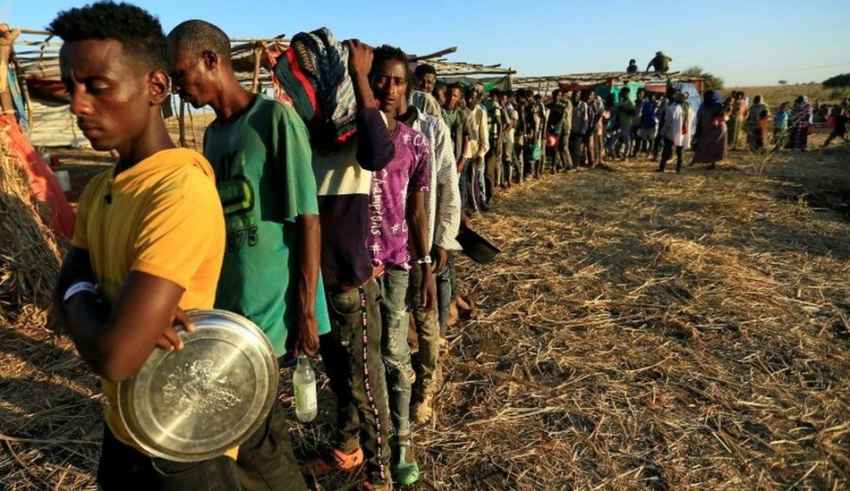
Tigray, Ethiopia, is currently witnessing the worst humanitarian crisis in modern history, and half the world has not even heard about it. The region has been destabilized since November 2020, when the conflict between the Tigray People’s Liberation Front and the Government of Ethiopia began. The ongoing conflict has killed thousands and internally displaced millions of Ethiopians. An estimated 59,000 people have fled Ethiopia and found refuge in eastern Sudan. The remaining population is in desperate need of humanitarian aid. In addition to severe food insecurity, gender-based violence, and lack of access to proper healthcare, social welfare and justice services are wreaking havoc in the region. About half a million children are estimated to lack food in Tigray, including more than 115,000 severely malnourished. Genocide Watch has placed Ethiopia at Stage 9 of Genocide. Most news agencies have not reported the crisis. The few that does has it hidden on Page 3, while the Ukrainian Crisis still takes up the front pages. The UNHRC and the WFP have been trying to provide aid. However, the ongoing armed conflict in the region is blocking these efforts. Both sides accuse the other of preventing the inflow of aid, and the people of Tigray are suffering. The Covid19 crisis has further aggravated the armed conflict in the region. A temporary cease-fire since March was broken this week. The African Commission on Human and Peoples’ Rights established a Commission of Inquiry, but the AU has failed to make any significant progress in resolving the conflict as the Ethiopian government is infamous for its disrespect to the AU and its delegation. African Union’s attempt to mediate for the past two years is insufficient in the face of an active genocide. The lack of urgency to resolve the largest humanitarian crisis in modern history raises an important question, why is the international community silent?
This is not the first time the international community has ignored such a humanitarian crisis. The Tigray conflict has a striking resemblance to the Rwandan Genocide, which resulted in the killing of 500,000 Tutsis. Both countries are in Africa; both countries have a predominantly dark-skinned population, both are poor and overpopulated, and in both situations, the saviours from the west is/were silent. The WHO chief, Tedros Adhanom Ghebreyesus, lashed out at the international community for its ignorance of the Tigray Crisis. He suggested that racism is driving the lack of interest in the ongoing war in Ethiopia. This is not a new concern. Conflicts in the East and African Nations have often been ignored by the global west. Conflicts in countries like Myanmar, Syria, Afghanistan and Yemen are examples of the same. These nations only get a fraction of the media attention and conversation the war in Ukraine garnered. The world really does differentiate between black and white lives.
Why should the developed world care?
Considering humanitarian grounds are no longer the motive to interfere in Tigray, the international community must take immediate action, at least to prevent the refugee crisis that would stem from the armed conflict. The Rwandan Genocide resulted in the Great Lakes Refugee Crisis, where around two million Rwandans were exiled to neighbouring countries. The aftermath of the crisis would be similar. In fact, records show an exodus of millions of people to neighbouring nations already and millions to follow suit. Countries around the world, despite being parties to the Refugee Convention, have been reluctant to harbour refugees in their nations. Many believe that refugees threaten their standard of living or safety and culture. This can be minimized if a solution to the war in Ethiopia can be achieved. Therefore, the nation-states, especially the ones bordering Ethiopia, should take special interest in resolving the conflict in the region.
At the same time, developing nations must live up to their claim of global leadership and humanitarianism. It is established that security and prosperity at home are linked to economic and political health abroad. In the next 35 years, Africa’s population is expected to double, comprising nearly 30 per cent of the world’s population by 2050. By 2025, an additional 90 million African households will enter the consumer class and would contribute purchasing power of $2.1 trillion to the global economy. Africa is rich in natural resources and even richer in human resources. The potential of Africa is unlimited, and developed nations must race to tap into this potential. Unfortunately, corruption, political instability and armed conflict are a hindrance to achieving this. Therefore, the developed world should have a vested interest in preventing conflict in the region. Similarly, the foundation of international law and diplomacy is reciprocity. However, Countries often tend to ignore these principles of universality and reciprocity when it comes to poor nations inhabited by darker-skinned people. The international communities’ ambivalence toward Africa is disheartening. The UN and AU must take immediate action to prevent another Rwanda. Or is it already too late?
References
https://www.unrefugees.org/emergencies/ethiopia/
https://www.voanews.com/a/us-eu-officials-urge-talks-to-settle-ethiopia-tigray-conflict/6683974.html
https://www.usip.org/publications/2017/03/americas-role-world
https://www.genocidewatch.com/single-post/genocide-emergency-ethiopia-1
By The European Institute for International Law and International Relations.















